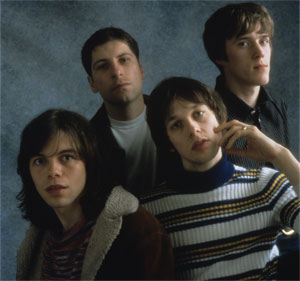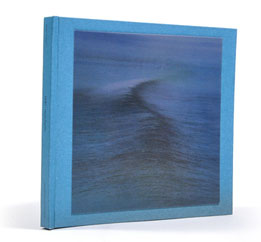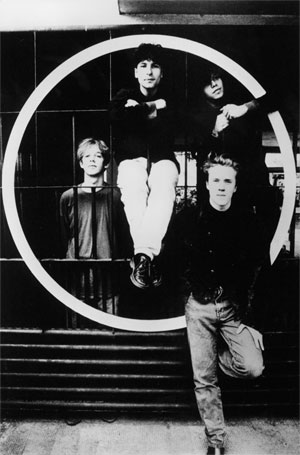Ride split in 1996. While guitarist Andy Bell and vocalist/guitarist Mark Gardener have played together here and there since — and all four members gathered for a detailed interview last year in their original homebase of Oxford, England — the band has never reunited for any sort of tour or festival appearance. (The only time the quartet has performed together since the dissolution was in 2001, when it reunited for a TV show which honored Sonic Youth.) When I interviewed Gardener in 2007 for a story on Rhino’s Brit Box, he admitted that the topic of a reunion had come up in conversation — but it didn’t hold much of an appeal to him.
”I really like the myth of Ride,” Gardener said. ”Of course the money [we would get to reunite] would be appreciated; we’d get stupid offers to reform and play certain festivals and stuff. But at the same time, it’s kind of done, really. We’re all busy with our own projects. Of course you can re-form, but you can’t re-form that time and what [was] going on.”
The ”myth of Ride” is actually an asset to the band’s catalog — and in particular its 1990 debut, Nowhere, which is being given the 2-CD reissue treatment by Rhino Records. Without any modern comparisons to sully its memory, the album feels frozen in time, a dreamlike snapshot of a truly indie underground. While known as a shoegazing touchstone — a tag borne out by winsome vocals and the viscous swirls of distortion scattered throughout — Nowhere is much more than that tag implies.
”Kaleidoscope” is a louder, rowdier version of 80s janglers such as the Smiths, while the tune’s wobbly dueling vocal lines are charmingly askew and lo-fi. Gardener and Bell’s psychedelic-tinged harmonies mesmerize the feedback and clouds of noise snaking through ”Seagull.” ”Decay” is a furious post-punk surge with dark ridges, background chaos and repetition of the ominous utterance, ”We die.” And with its mournful harmonica, unified burnt-sugar harmonies and warm-water riffs, ”Here & Now” foreshadows the coming Britpop movement.
Steve Queralt’s basslines are subtle and unobtrusive, so intertwined in the fabric of the album that they blend into the scenery. Loz Colbert, meanwhile, is a versatile, steady drummer who attacks with ferocity (the bashing ”Taste”) or maintains a measured beat (”Paralysed”) with equal verve. Above all, though, Nowhere announced Ride’s arrival as a guitar band. Not a guitar band in the sense that Swervedriver was a guitar band — i.e., one with a muscular, almost metallic sheen — but one characterized by its riffs and melodies.
Gardener and Bell’s guitars often careen to the forefront of the music; they wind around each other like thick stalks of ivy — sometimes chalky with noise (”Polar Bear,” ”Seagull”), and other times delicate (”In a Different Place”). At other times, the band’s control was awe-inspiring. The majestic, measured ”Dreams Burn Down” and its melodic brightness sounds like an astronaut floating in space: graceful, faraway, slow-motion. Ride understood the importance of restraint, and it understood how to wield noise. But it also never used the latter to bludgeon the listener into emotional submission — and its squalls were never gratuitous.
Lyrically, Nowhere explores mature, nuanced themes. Its songs are obsessed with the ephemeral nature of dreams, romance and even life itself; these things slip away and disappear (if they were even within reach to begin with). The ideas of death and rebirth also crop up on occasion. The yawning chasm implied by the word Nowhere fits the album’s sense of resignation. Everything is temporary, nothing is solid and isolation almost seems inevitable — frightening, but altogether unavoidable. Despite this melancholy, though, Nowhere never sounds bogged down or dreary. Its sadness and confusion equal comfort — perhaps because what the album tackles is so universal.
As on Nowhere’s 2001 reissue, this anniversary edition also contains 1991’s Today Forever EP. That release’s highlight is the insistent brow-furrow ”Unfamiliar,” whose prominent Queralt bassline creates ominous friction below the minor-chord jangle and occasional spurt of chaos. For fans, however, the biggest draw on this new version of Nowhere is a 1991 live show recorded at the Roxy. Although the group’s power isn’t at all diminished in concert, how Ride employed dynamics for effect remains impressive today. The band starts the show in a lull, thanks to a subdued slow-burning ”Polar Bear” — and then immediately increases the tempo, volume, intensity and noise with a suckerpunching ”Seagull.”
The band dominates the rest of the twelve-song set thanks to such pacing — culminating in a drone-driven sprawl ”Nowhere” right into the candy-coated pop tart ”Chelsea Girl” and then the wild-eyed psych trudge ”Drive Blind.” Yet the best part about the concert is how warm — and human — Ride sounds. The vocals on ”Dreams Burn Down” tremble on the verge of off-key, as they do (even more) on ”Vapour Trail”; the latter’s brisker tempo, strummier chords and wobbly melody is at once devastatingly innocent and wise beyond its years.







Comments